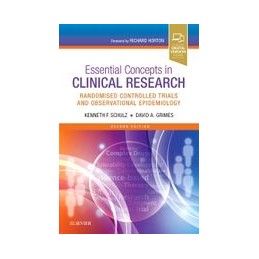- Obniżka


 Dostawa
Dostawa
Wybierz Paczkomat Inpost, Orlen Paczkę, DHL, DPD, Pocztę, email (dla ebooków). Kliknij po więcej
 Płatność
Płatność
Zapłać szybkim przelewem, kartą płatniczą lub za pobraniem. Kliknij po więcej szczegółów
 Zwroty
Zwroty
Jeżeli jesteś konsumentem możesz zwrócić towar w ciągu 14 dni*. Kliknij po więcej szczegółów
This practical guide speaks to two audiences:: those who read and those who conduct research. Clinicians are medical detectives by training. For each patient, they assemble clinical clues to establish causes of signs and symptoms. The task involves both clinical acumen and knowledge of medical research. This book helps guide clinicians through this detective work, by enabling them to make sense of research and to review medical literature critically. It will also be invaluable to researchers who conduct clinical research, particularly randomized controlled trials.
Building on previously published, peer-reviewed articles from The Lancet, this handbook is essential for busy clinicians and active researchers interested in research methods.
Opis
Introduction
1. An overview of clinical research: the lay of the land
?Observational studies
2. Descriptive studies: what they can and cannot do
3. Bias and causal associations in observational research
4. Cohort studies: marching towards outcomes
5. Case-control studies: research in reverse
6. Finding controls for case-control studies: compared to what?
7. Limitations of observational epidemiology
??Screening tests
8. Uses and abuses of screening tests
9. Refining clinical diagnosis with likelihood ratios
?Randomized controlled trials
10. Boosting participant recruitment in trials
11. Sample size calculations in randomized trials: mandatory and mystical
12. Generation of allocation sequences in randomized trials: chance not choice
13. Generation of allocation sequences in non-double-blinded randomized trials: guarding against guessing
14. Allocation concealment in randomized trials: defending against deciphering
15. Exclusions and losses in randomized trials: sample size slippages
16. Blinding in randomized trials: hiding who got what
17. Implementing treatment blinding in randomized trials
18. Surrogate endpoints and composite outcomes: shortcuts to unknown destinations
19. Multiplicity in randomized trials I: endpoints and treatments
20. Multiplicity in randomized trials II: subgroup and interim analyses
21. Conducting randomized trials as part of a prospective meta-analysis
Publishing
22. Reporting studies in medical journals: CONSORT and other guidelines
